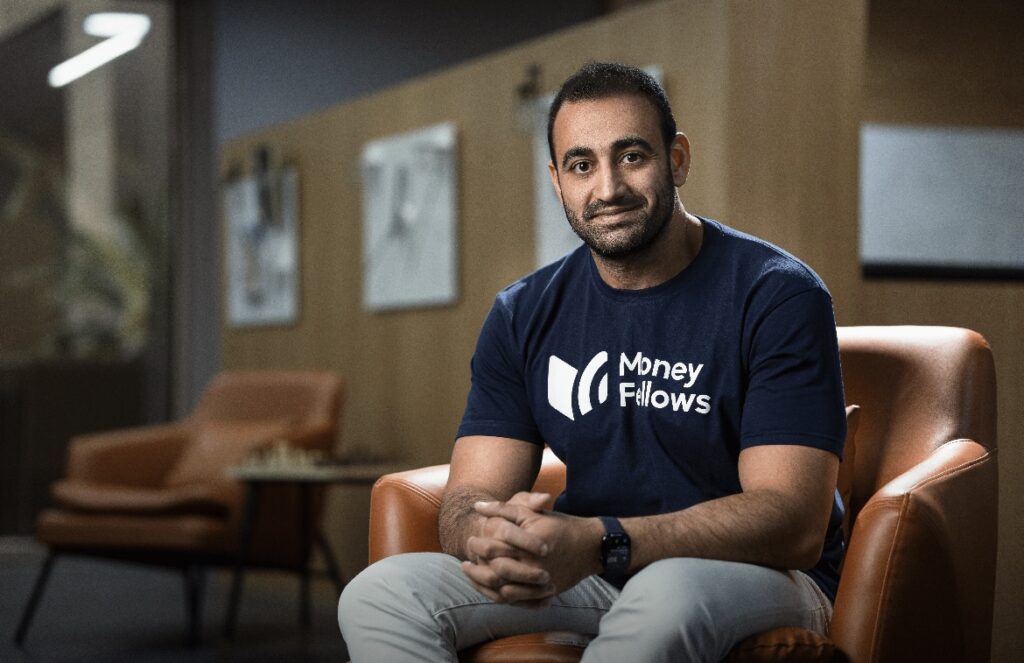
<strong>Image Credits:</strong>MoneyFellows
MoneyFellows Raises $13M for ROSCA Fintech Expansion Beyond Egypt
Table of Contents
- Funding Details and Investor Lineup
- Understanding the Digital ROSCA Model
- MoneyFellows’ Unique Financing Approach
- Growth Metrics and Profitability Achievement
- Regional Expansion Plans Starting with Morocco
- Expanding the Product Ecosystem
- Implementation Challenges of Digital ROSCAs
- Market Outlook and Future Prospects
- Investor Perspective on Digital ROSCAs
MoneyFellows, the Egyptian fintech digitizing rotating savings and credit associations (ROSCAs), has secured $13 million in pre-Series C funding to expand beyond its home market. Unlike most digital lenders requiring significant working capital, MoneyFellows has achieved profitability while facilitating billions in loans with minimal balance sheet exposure. With 8.5 million users and plans to launch in Morocco by year-end, the company is poised to bring its battle-tested ROSCA model to new markets across Africa and South Asia.
Funding Details and Investor Lineup
Cairo-based MoneyFellows has successfully raised $13 million in a pre-Series C funding round, positioning the company for significant regional expansion. This latest investment was co-led by Casablanca-based Al Mada Ventures and DPI’s Nclude Fund, with participation from Partech Africa and CommerzVentures, bringing the company’s total funding to over $60 million since its founding in 2016.
The funding round represents a strategic bridge to a much larger Series C planned for next year, according to founder and CEO Ahmed Wadi. Unlike many fintech funding announcements highlighting aggressive growth at all costs, MoneyFellows emphasizes its path to profitability and capital-efficient model as key differentiators attracting investor interest.
MoneyFellows Funding Journey
Understanding the Digital ROSCA Model
At the core of MoneyFellows’ business is the digitization of one of the world’s oldest financial systems: the rotating savings and credit association (ROSCA). These informal savings groups, known as “gam’eya” in Egypt, “esusu” in Nigeria, and “kameti” in India, have been a financial staple across emerging markets for generations but have remained largely offline until now.
“ROSCA’s are very old financial arrangements, with roots going back hundreds, if not thousands of years. AMV was impressed by the modernized version of this business that Money Fellows was able to build, positively impacting thousands of families in Egypt.”
The traditional ROSCA model functions as a collective savings mechanism where a fixed number of participants each contribute a set amount regularly to a shared pool. Each cycle, one member receives the full payout, and the process repeats until all participants have received their turn. For example, in a group of 10 people each contributing $1,000 monthly, one person receives $10,000 each month until the 10-month cycle completes.
- Limited to trusted personal networks
- Geographical constraints
- Manual tracking and management
- High dropout risk without formal enforcement
- Limited scalability
- No credit scoring or optimization
- Open to broader user population
- National-scale participation
- Automated payments and management
- Formal enforcement mechanisms
- Highly scalable infrastructure
- AI-powered slot matching and optimization
MoneyFellows’ Unique Financing Approach
What makes MoneyFellows particularly remarkable in the fintech landscape is its ability to facilitate billions in Egyptian pounds of lending with minimal balance sheet exposure. Unlike traditional digital lenders that must borrow capital from banks or other financial institutions to fund their loan books, MoneyFellows predominantly uses the capital from its own user base to fund payouts.
The company’s approach centers on sophisticated matching algorithms that pair savers (typically those who prefer later payout slots) with borrowers (those who prefer earlier slots). This peer-to-peer structure means MoneyFellows only needs to step in with its own capital when a ROSCA group has unfilled slots, which happens in just 7-8% of cases according to Wadi.
The working capital efficiency of MoneyFellows contrasts sharply with most digital lenders and BNPL providers, who typically have 100% working capital exposure on their loan books. This dramatically different risk profile enables the company to scale lending operations with far less debt on its balance sheet than competitors.
To support growth initiatives and handle the small percentage of ROSCA circles requiring capital injections, the company is in advanced discussions with local banks to secure additional working capital. Even with these facilities, the model remains predominantly self-funding through user contributions.
Growth Metrics and Profitability Achievement
MoneyFellows has demonstrated impressive growth metrics while maintaining financial discipline, positioning it among a select group of African fintech startups operating profitably. Since its commercial launch in 2018, the platform has expanded to over 8.5 million users, nearly doubling from the 4.5 million reported at its previous funding milestone.
The average payout per user has also seen significant growth, nearly doubling from 23,000 EGP ($453) to 45,000 EGP ($906) over the past two and a half years. This increase reflects both the platform’s success in attracting higher-income segments and growing user confidence in the digital ROSCA model.
“We have managed to crack this model and reach profitability. Doing this while lending out billions without relying on working capital at all is quite disruptive in itself.”
The viral nature of the ROSCA model has contributed significantly to MoneyFellows’ organic growth. When users digitize their experience on the platform, they often bring their entire offline ROSCA group with them, creating powerful network effects that drive user acquisition at low cost.
Regional Expansion Plans Starting with Morocco
With its new funding secured, MoneyFellows is now accelerating its long-planned expansion beyond Egypt. After eight years of refining its model in one of Africa’s largest fintech markets, the company has set its sights on Morocco as its first international destination, with plans to launch operations there by the end of 2025.
Morocco represents a strategic choice for MoneyFellows’ first international expansion for several reasons. The country offers familiar dynamics to Egypt: a large unbanked population, a strong informal savings culture (with local ROSCAs known as “daret”), and a regulatory environment amenable to fintech innovation. The company has already secured key partnerships and regulatory approvals in Morocco, laying groundwork for a smooth entry.
MoneyFellows is also betting that major upcoming events like the 2030 FIFA World Cup, which will be co-hosted by Morocco, will accelerate digital adoption in the country and create favorable conditions for fintech growth. This strategic timing could provide significant tailwinds for the company’s expansion efforts.
Beyond Morocco, the company is evaluating other markets across Africa and South Asia with similar informal financial systems and demographic profiles. However, entering more diverse markets will test the model’s adaptability in regions where formal banking might be more entrenched or where informal finance operates under different cultural dynamics.
Expanding the Product Ecosystem
While the digital ROSCA remains MoneyFellows’ core offering, the company has begun expanding its product ecosystem to serve more of its users’ financial needs. Earlier this year, the fintech launched a card product that allows users to receive payouts, repay installments, and spend across a merchant network, bringing added convenience to its platform.
This card launch represents just the beginning of a broader product roadmap. The eight-year-old company plans to introduce investment, payroll, insurance, and remittance products in the coming years, further embedding itself in users’ financial lives and increasing customer lifetime value.
These expansions beyond the core ROSCA product put MoneyFellows in more direct competition with other Egyptian digital banks and financial services players like Lucky, Khazna, and Telda. However, its massive user base and proven trust in handling users’ finances gives it a solid foundation from which to launch these adjacent services.
Implementation Challenges of Digital ROSCAs
Digitizing the ROSCA model presents unique challenges that have tripped up many previous attempts, including those by banks and telecommunications companies. According to Wadi, the complexity of the model was a key reason why the company’s international expansion took longer than initially planned in 2022.
Implementing a successful digital ROSCA platform requires sophisticated systems for matching users to appropriate slots based on their risk profiles, balancing thousands of active circles simultaneously, minimizing default and dropout risk, and maintaining user trust throughout the process. Without each of these elements working in harmony, digital ROSCA platforms can quickly fail.
“Cracking the model took longer than we thought. But it was worth the time. Most attempts to scale Roscas digitally, even by banks and telcos globally, have failed because they underestimated how complex the underlying behavior is.”
MoneyFellows’ nearly decade-long focus on perfecting this model in Egypt before expanding internationally reflects the technical and operational sophistication required to successfully digitize what appears on the surface to be a simple concept. Similar models exist globally, including Pakistan’s Oraan and the UK’s StepLadder, but few have reached the scale of MoneyFellows.
Market Outlook and Future Prospects
Looking ahead, MoneyFellows is positioning itself to become a pan-regional financial platform leveraging its battle-tested ROSCA model as both a user acquisition engine and a capital-efficient lending mechanism. The company’s established profitability in Egypt provides it with a strong foundation for sustainable expansion.
While regional expansion will require patience as the company adapts its model to new markets, MoneyFellows’ plans for a larger Series C round next year suggest confidence in its ability to successfully scale beyond Egypt. The involvement of Morocco-based Al Mada Ventures in the latest funding round also indicates strategic alignment with the company’s North African expansion plans.
One key advantage MoneyFellows maintains over other regional expansion plays is its inherently viral product. The social nature of ROSCAs means that customer acquisition costs can remain relatively low even in new markets, as each new user typically brings others into the ecosystem, creating powerful organic growth channels.
Investor Perspective on Digital ROSCAs
The latest investment in MoneyFellows reflects growing investor interest in fintech models that leverage existing cultural financial behaviors rather than imposing entirely new systems. By digitizing the familiar ROSCA model, MoneyFellows taps into deep cultural understanding and trust, creating a more natural adoption pathway than purely novel financial services.
For investors like Al Mada Ventures, the combination of MoneyFellows’ proven profitability, capital-efficient model, and massive addressable market across Africa and South Asia presents a compelling investment case in a climate where sustainable unit economics have returned to the forefront of venture capital priorities.
“This model is naturally viral. If you digitize the experience for two members of an offline ROSCA, they often bring the other eight with them. That kind of organic growth is hard to beat.”
As MoneyFellows pursues its regional expansion strategy, it joins a select group of Egyptian fintech companies with genuine pan-African ambitions. The success or failure of its Morocco launch will serve as an important case study for other Egyptian startups considering regional expansion, particularly those with business models built around traditional financial behaviors.
Key Takeaways on MoneyFellows’ $13M Funding
- MoneyFellows secured $13M in pre-Series C funding led by Al Mada Ventures and Nclude Fund
- The Egyptian fintech has reached 8.5 million users while achieving profitability
- Unlike traditional lenders, MoneyFellows operates with minimal balance sheet exposure
- The company will expand to Morocco by year-end, with other regional markets in its sights
- Average user payout has nearly doubled to 45,000 EGP ($906), showing increased platform trust
- MoneyFellows is expanding beyond core ROSCA products to cards, investments, and insurance
- The platform’s naturally viral nature drives powerful organic user acquisition





